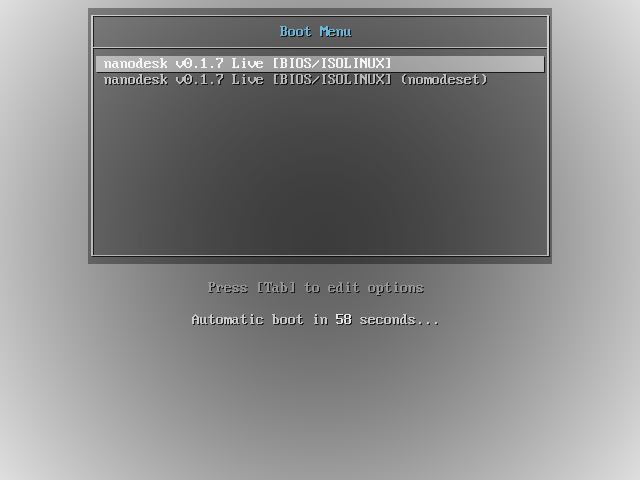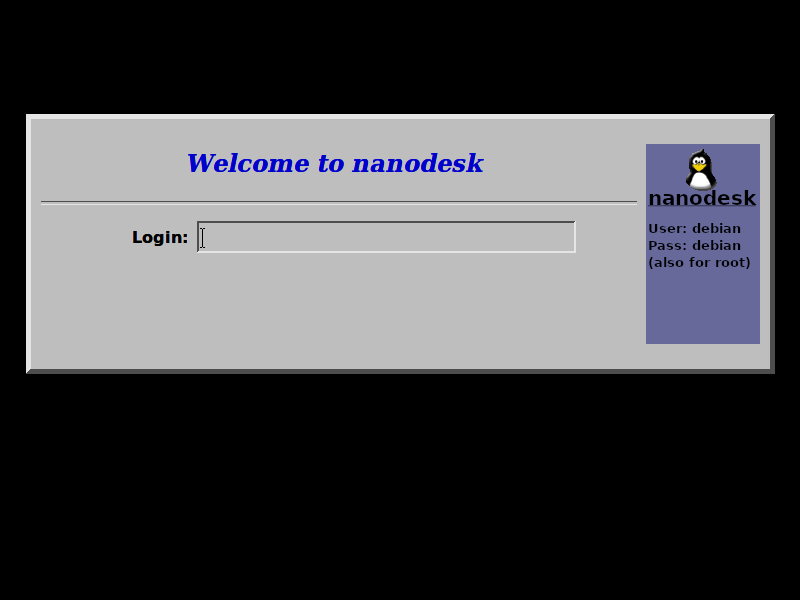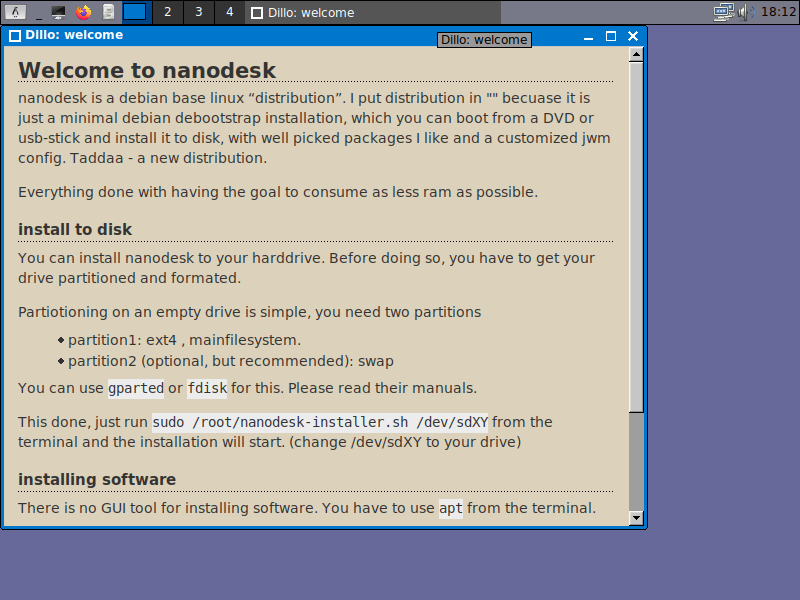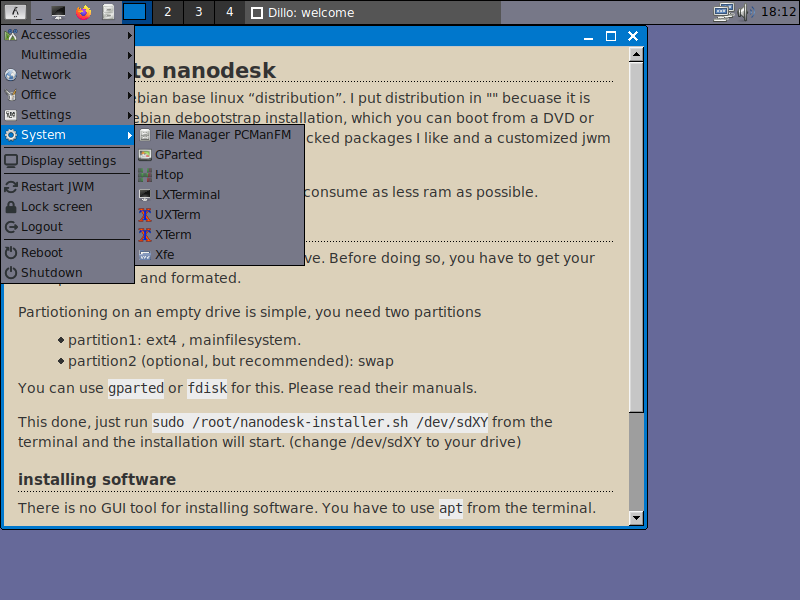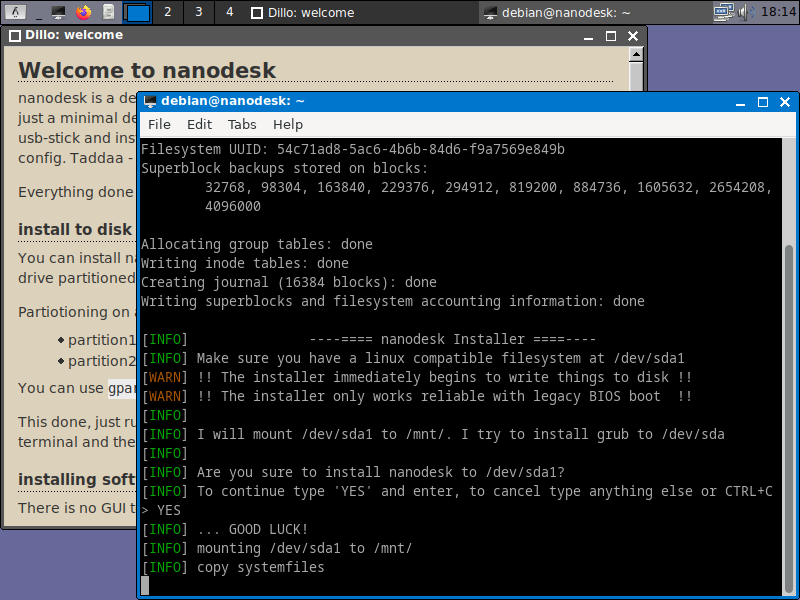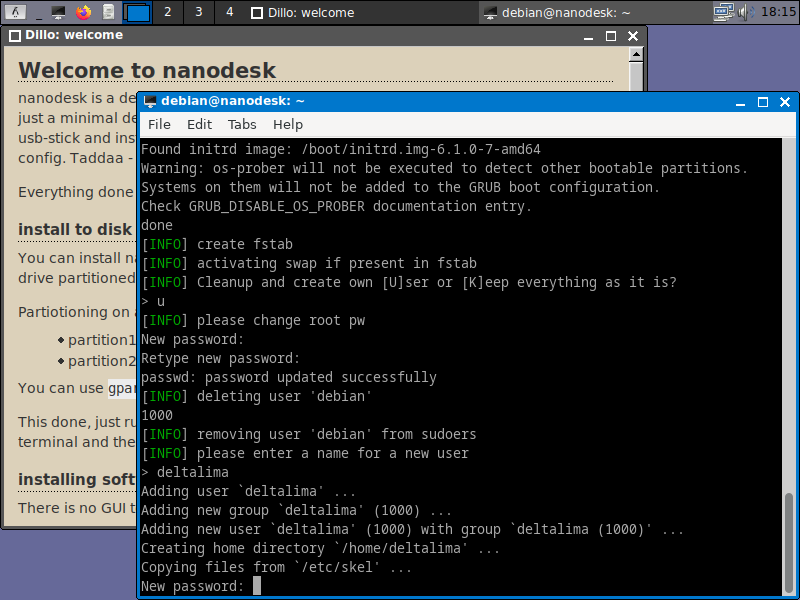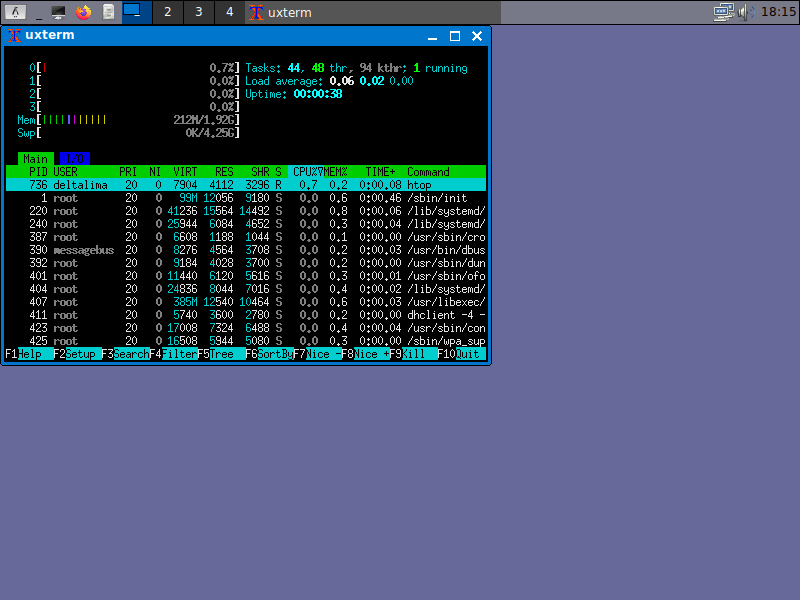| deb | ||
| install_base | ||
| nanodesk-files | ||
| pandoc | ||
| screenshots | ||
| templates | ||
| makeanything.conf | ||
| makeanything.sh | ||
| README.md | ||
nanodesk - leightweight linux (live) desktop
Origin: https://git.la10cy.net/DeltaLima/nanodesk
nanodesk is a less resources consuming debian linux "distribution" using the jwm window manager, which I made for fun and learning.
"distribution" because, it is just a debootstrap with some extra packages and custom jwm config, baked together with live-boot and a little installer script for installing nanodesk on a harddrive.
My goal is to have a (live) system which is very lightweight and still usable too. This is for a VM where you need a basic graphical environment or for an old computer with less resources.
Screenshots
The most important thing about a completely useless linux distro are the screenshots.
Here you go!
Build it your own!
If you want to build nanodesk by your own, maybe with your own customisations - makeanything.sh will cover you.
This script will perform all tasks which are necessary to build nanodesk from scratch, including installing packages on your host machine where you build nanodesk.
The script is tested running with Ubuntu 22.04.
Simply run ./makeanything.sh and the show will start!
Your .iso file will be in build/nanodesk-vX.Y.Z. Git tags are used for versioning.
You can give the script a custom debian-mirror, if your prefer e.g. ./makeanything.sh http://ftp.debian.org/debian/
customize nanodesk
Of course you can customize nanodesk to fit your needs!
The simplest way is to add your favorite packages to the nanodesk live-image. Just add them to
the file templates/install_base.custompkg.tpl.sh
For example, let's add Abiword and Pidgin to nanodesk, the file would look like
apt install -y \
audacious \
abiword \
pidgin
Now run makeanything.sh and you will have both programs on your live-linux.
You can also jump into the chroot with chroot build/chroot/ /bin/bash and do customizations by hand. Just run makeanything.sh afterwards to recreate the .iso
Keep in mind that the chroot does not get recreated everytime you run makeanything.sh.
While experimenting around it could be helpful to delete your complete build/ directory
sudo rm -Rf build
keeping a fresh copy of build/chroot/ after the first debootstrap is also a good idea to save bandwidth :)
sudo cp -a build/chroot build/chroot.bak
install nanodesk on harddrive
When you booted nanodesk from the iso, then you can install nanodesk to your harddrive. In the homefolder of root ist the installerscript install_nanodesk.sh
Before doing so, you have to create, if not already existing, a partition with a formatted linux compatible filesystem (e.g. ext4).
nanodesk comes with fdisk, so you can create it very quick and format the partition afterwards. When you decide to create a swap-partiotion, do not forget to run mkswap. Then the installer will detect it automatically (I hope so!) and use it.
This is an example, how to do the partitioning and formatting.
debian@nanodesk:~$ sudo su -
root@nanodesk:~# fdisk /dev/sda
Welcome to fdisk (util-linux 2.36.1).
Changes will remain in memory only, until you decide to write them.
Be careful before using the write command.
Command (m for help): o
Created a new DOS disklabel with disk identifier 0xe29b8e3b.
Command (m for help): n
Partition type
p primary (0 primary, 0 extended, 4 free)
e extended (container for logical partitions)
Select (default p): p
Partition number (1-4, default 1): 1
First sector (2048-16777215, default 2048):
Last sector, +/-sectors or +/-size{K,M,G,T,P} (2048-16777215, default 16777215): +7700M
Created a new partition 1 of type 'Linux' and of size 7.5 GiB.
Command (m for help): n
Partition type
p primary (1 primary, 0 extended, 3 free)
e extended (container for logical partitions)
Select (default p):
Using default response p.
Partition number (2-4, default 2):
First sector (15771648-16777215, default 15771648):
Last sector, +/-sectors or +/-size{K,M,G,T,P} (15771648-16777215, default 16777215):
Created a new partition 2 of type 'Linux' and of size 491 MiB.
Command (m for help): t
Partition number (1,2, default 2): 2
Hex code or alias (type L to list all): 82
Changed type of partition 'Linux' to 'Linux swap / Solaris'.
Command (m for help): w
The partition table has been altered.
Calling ioctl() to re-read partition table.
Syncing disks.
root@nanodesk:~# mkfs.ext4 /dev/sda1
mke2fs 1.46.2 (28-Feb-2021)
Creating filesystem with 1971200 4k blocks and 492880 inodes
Filesystem UUID: 59b069ae-d9be-4fc0-a277-4204d20dc293
Superblock backups stored on blocks:
32768, 98304, 163840, 229376, 294912, 819200, 884736, 1605632
Allocating group tables: done
Writing inode tables: done
Creating journal (16384 blocks): done
Writing superblocks and filesystem accounting information: done
root@nanodesk:~# mkswap /dev/sda2
Setting up swapspace version 1, size = 491 MiB (514846720 bytes)
no label, UUID=700c237a-d6ff-45d5-9cd9-8d623e851e06
root@nanodesk:~# ./install_nanodesk.sh /dev/sda1
Download
Yeah, you can download the .iso file.
Download: http://retro.la10cy.net/nanodesk/
Resources
- Linux Logo Button: https://freesvg.org/linux-key-vector-button
- xdgmenumaker deb package: https://bgstack15.wordpress.com/2020/03/03/package-for-devuan-xdgmenumaker/
- How To debootstrap a small desktop system: https://git.la10cy.net/DeltaLima/devnull/src/branch/main/debootstrap_minimal_dekstop_from_scratch.md
- How To create a linux live cd: https://www.willhaley.com/blog/custom-debian-live-environment/
